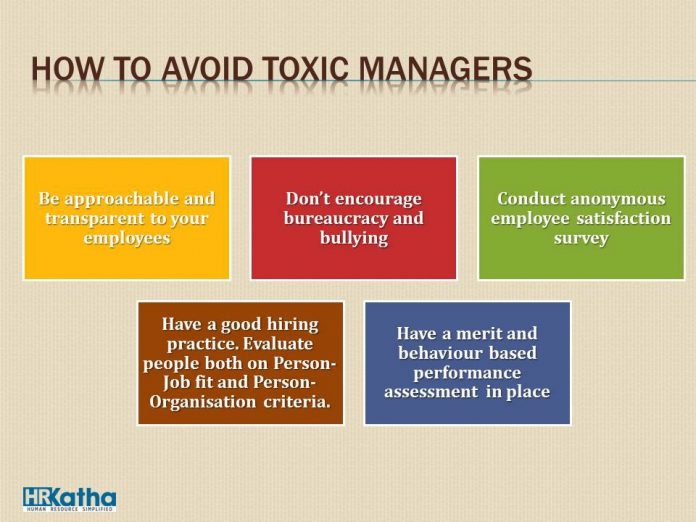It has been observed that if organisations take corrective measures in counselling and training such toxic managers, they can turn out to be really productive.
Every organisation has toxic managers. However, they are often not identified or are preferred to be ignored because companies just don’t have the bandwidth to deal with it.
Many a times, I have thought, why not fire the toxic managers and keep the workplace clean. But then I have also wondered, whether that will resolve the problem.
It has been observed that if organisations take corrective measures in counselling and training such toxic managers, they can turn out to be really productive.
But, how do we identify the toxic managers.
1. They are typical ‘X’ managers as per Theory X and Theory Y of employee motivation. Theory X assumes that employees dislike working and need to be controlled and threatened for deliveries. They do not trust the employees.
2. They have a few favourites whom they lend their ears to. Others are not allowed to put their views in any form. They also encourage gossip mongers and politics at the workplace.
3. They pretend to be jack of all trades and keep giving unsolicited advice to anyone and everyone. Even in situations where a particular task is to be taken care of by a particular department, they will jump in with the sole intention to garner attention.
4. They will always try to prove how powerful they are than others. This will be evident from their parlance and body language.
5. They will typically be poor listeners, will lack empathy.
6. They are highly unpredictable; they will shift loyalties under circumstances.
7. They are averse to reverse mentoring; they are typical 18th century managers, treating people as per their title and position.
8. They criticize others for no good reasons.
Now let’s look at the impact of the toxic managers on organisation and peers.
We all know how performance is a combination of ability, motivation and environment. The bitter words of the toxic managers can shake the self-confidence of any able employee and affect his/her mental as well as physical health.
A toxic manager is directly proportional to the poor motivation level in the team. This leads to a negative environment at workplace irrespective of skillset and ability of team members and eventually results in poor performance.
However, organisations should be careful before branding an employee as toxic. Many a times, a manager may be called toxic on the basis of the experience of a few people but this could be dangerous. There could be several other opinions on that person being non-toxic.
There is always a probability that such managers showcase a toxic behaviour only in a particular situation. It’s also interesting to note that many people, who tend to be toxic at workplace, are quite normal and pleasant in their personal and social life.
This is why it is important to understand how or why one person turns out to be a toxic manager.
Many a times the reasons are more personal and at times even organisational
 Proactive identification of such behaviours at the workplace and accordingly helping the toxic managers to behave in an acceptable way by giving feedback and counselling, will definitely improve the work environment and performance. Great organisations encourage arguments and debates and do not let a senior person throw tantrum.
Proactive identification of such behaviours at the workplace and accordingly helping the toxic managers to behave in an acceptable way by giving feedback and counselling, will definitely improve the work environment and performance. Great organisations encourage arguments and debates and do not let a senior person throw tantrum.
There are managers who are technically capable, but they fail miserably when it comes to people management skills. Even then organisations continue to up the ante by hiring wrong fit managers in the system. There could be varied reasons for the same – either a project is in a critical stage or a very critical resource has left the business.
If any manager or any employee is famous for his toxicity, timely intervention may help both the employee as well as the organisation. Don’t nurture toxic mangers! Identify them and help them transform.
Value our content... contribute towards our growth. Even a small contribution a month would be of great help for us.
Since eight years, we have been serving the industry through daily news and stories. Our content is free for all and we plan to keep it that way.
Support HRKatha. Pay Here (All it takes is a minute)





































This article shows the way to address an omnipresent issue encountered by every professional.
I personally do not like toxicity theory. Every one and every job has his/her/it’s own strengths and weaknesses. The bosses and HR need to identify these strengths and weaknesses and coordinate the deployments. Since this is not being done religiously by the bosses and HR, due to their own incompetencies, the other individual employees are blamed as X or toxic.
I have a manager that matches points 1, 2, 3, 4, 6, 7 and 8 exactly! This is like looking at his character description